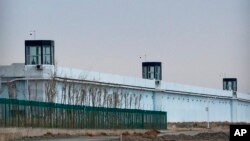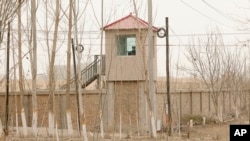August is a significant month for international human rights organizations and the Uyghur diaspora, who have been anticipating a long-promised report on Xinjiang from the Office of the United Nations High Commissioner for Human Rights (OHCHR).
"As we have said, the high commissioner has committed to publishing the report before her term finishes at the end of the month," OHCHR spokesperson Liz Throssell told VOA.
Ahead of High Commissioner Michelle Bachelet's departure from her office and her planned release of OHCHR's human rights assessment in Xinjiang, China in recent weeks has ramped up its pressure on Bachelet to bury the Xinjiang human rights report through letter and email campaigns.
Pressure from China
Last week, the state-run publication China Daily reported that Uyghurs in Xinjiang sent emails to Bachelet, sharing their "personal stories and expressing anger" at learning about how the region is portrayed by "anti-China forces."
"Many witnesses and families of the victims of terrorism hope that Bachelet can learn more about the impact of the brutal attacks by reading their emails," the China Daily wrote, referencing a report by Chinese state news agency Xinhua. "From 1990 to 2016, separatists, extremists and terrorists plotted and carried out thousands of terror attacks in Xinjiang."
The China Daily said Beijing's solution to fighting terrorism is to set up "vocational education and training centers to help those who may be influenced by terrorism and extremism."
"[O]ur office receives a lot of emails, both from individuals and also more organized email campaigns, and we don't comment on such correspondence," Throssell told VOA when asked about the emails.
Last month, Reuters reported that Beijing sent a letter to the U.N. rights chief asking her not to release the assessment on the human rights situation in Xinjiang out of "grave concern" that if published it would further politicize human rights in China.
Human rights organizations
International human rights organizations such as Amnesty International and Human Rights Watch as well as countries including the U.S. accuse China of human rights abuses against Uyghurs and other Turkic Muslims in Xinjiang. The accusations include mass arbitrary incarceration of Muslims in internment camps, forced labor, forced sterilization of women, and forced separation of school-aged children from their parents. Beijing has repeatedly denied the accusations as "fabrication" by forces hostile to China.
After years of negotiations for "unfettered access" to the Uyghur region of Xinjiang, Bachelet finally traveled in May to China, including Xinjiang, where Beijing is accused of the mass incarceration of nearly 2 million Uyghurs and other Turkic Muslim populations.
During her visit, international rights groups accused Bachelet of being soft on China and urged her to "publicly acknowledge the scale and gravity of human rights violations being committed by the Chinese government," Agnes Callamard, Amnesty International's secretary-general, said on the organization's website.
While in China, critics said, Bachelet referred to Xinjiang detention centers as "vocational and educational training centers," using China's own terminology, and asked the Beijing government to review counterterrorism measures. Bachelet also praised China's achievements in poverty alleviation and health care. She did not publicly denounce the widely reported accusations of human rights abuses faced by Uyghurs and other Turkic Muslims in Xinjiang since 2016, causing a firestorm on social media.
The U.S. State Department also raised concerns that Bachelet and her team's visit to China was restricted and manipulated by China.
"We are further troubled by reports that residents of Xinjiang were warned not to complain or speak openly about conditions in the region, that no insight was provided into the whereabouts of hundreds of missing Uyghurs and conditions for over a million individuals in detention," according to a State Department press statement.
Xinjiang human rights assessment
According to Bachelet's office, Beijing will be given an opportunity to comment on the final U.N. human rights assessment on Xinjiang before it is released.
"As with all reports by OHCHR, once it is final, the report will be shared with the authorities for factual comments before publication. The report will need to be updated with our interactions and observations from the visit," Throssell wrote to VOA in an email.
She told VOA Bachelet's "access was limited" and pointed out that the trip was not intended to be an investigation into the alleged rights violations in Xinjiang.
Last Friday, Republican Senator Marco Rubio called on Bachelet to "immediately release" the report and "reject" the pressure from the Chinese government.
"As you approach your departure as high commissioner on August 31, the report remains buried while CCP diplomats reportedly conduct a flurry of confidential lobbying to halt its release," Rubio said in a statement on his website. "Do not let the CCP further taint your tenure as commissioner by withholding the report a minute longer."
After her China visit, Bachelet told reporters in June that she would release the report before she stepped down at the end of her four-year term.






